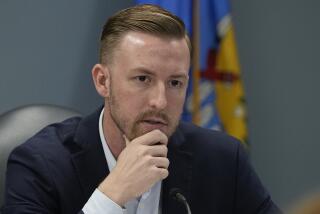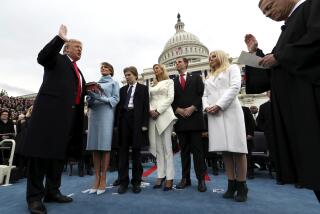Private Matter of Prayer Just Doesn’t Fit in Public Schools : Injecting religion back into government-run education won’t ensure a value-rich, crime-free society. But it is certain to cast some children as outsiders.
- Share via
In 1961 I found myself in a new public school after my parents’ divorce. I quickly learned it wasn’t just the building and neighborhood that were new--it was also the daily prayer. Every morning at my desk in third grade, I bowed my head and recited the Lord’s Prayer, which, being Jewish, I had never heard of.
I always felt conflicted about both bowing my head and being forced to learn a prayer that wasn’t “mine.” My confusion only intensified in my after-school religious classes, where the tenets of Judaism, which emphasized no bowing of any kind and excluded this prayer, were reinforced.
The Lord’s Prayer I recited again and again never helped me perform or behave better in school. My family demanded that. It didn’t provide me with values either; I got those from my Jewish home every Shabbat and every religious holiday. The Lord’s Prayer served only one purpose: It singled me out every morning by reminding me how radically different I was from all the other kids in my class.
The debate on reinstituting school prayer is being fueled by the incoming Republican majority in Congress. A constitutional amendment is promised by Rep. Newt Gingrich (R-Ga.) in 1995.
Based on my experience, I fear this amendment. Regardless of details, the outcome will be the same--a new crop of school children taught more each day about being shamefully different from Sam or Suzy.
As a spiritual and religious person, I not only believe in prayer, I have found great strength in it. I believe in prayer at home and in a house of worship. I believe in private silent prayers in your own mind at any time you choose to talk to your God. I also believe religion is a very private matter and should be forced on no one. Many years ago, our forefathers agreed.
I reared my teen-age daughter alone for most of her life. I introduced her to religion and reinforced its value. As a family today, we sometimes attend synagogue service and never miss Friday night Shabbat together at home. My daughter began Sunday school well before kindergarten, and she is now working toward confirmation. She struggled to learn Hebrew and explored leaving public school this year for a religious one.
She was educated in the public schools without one single day of school prayer. She never endured the embarrassment or shame that I did, and I am glad of that.
I want to see future students spared from that humiliation, and I want religion left where it should be: at home and in personally selected houses of worship.
The amendment would give each school district wide latitude in selecting a prayer. Students could “volunteer” not to recite it. Will there be classrooms across America with two sections, like smoking and nonsmoking seats, one for the godless and the other for believers? How might a Christian student in a predominantly Orthodox Jewish school district feel about “voluntary” morning prayers in Hebrew? Or a Muslim student “voluntarily” praying to Jesus in a very Catholic school district? Not to mention the problem of agnostic and atheistic families with children in the schools.
Many parents may not make religion an integral part of their home lives. Those mothers and fathers may instead be trying to keep a roof over their collective heads.
Whatever the family situation, it is wrong for the government to dictate that something as private as religion be injected into the school, especially when parents choose otherwise at home.
There is nothing voluntary about a district-selected prayer that teachers lead. Children will have only two options if they dissent: shut up or leave the room.
Those who object or leave, says Drew Yellen, a Northridge psychologist who has more than 25 years’ experience dealing with children, will be stigmatized.
“Kids get their strokes academically and on the playground,” he says. “Once peers determine a child doesn’t fit in, often kids are excluded across the board. Suddenly it’s no fun to go to school, especially if you and your lunch bag are sitting alone, and then your motivation, concentration and performance in class begin to falter.” High school kids might choose not praying as a way to stand out from the crowd, he says.
It need not come to this. Anyone can pray any time--before school, after school, during school if they wish. High school students have religious clubs. Parents can send children to religious schools. Putting government-sanctioned prayer back in the schools won’t ensure a value-rich, crime-free society. Fixing broken families will, and there’s no constitutional amendment that can quickly do that.
More to Read
Sign up for Essential California
The most important California stories and recommendations in your inbox every morning.
You may occasionally receive promotional content from the Los Angeles Times.













